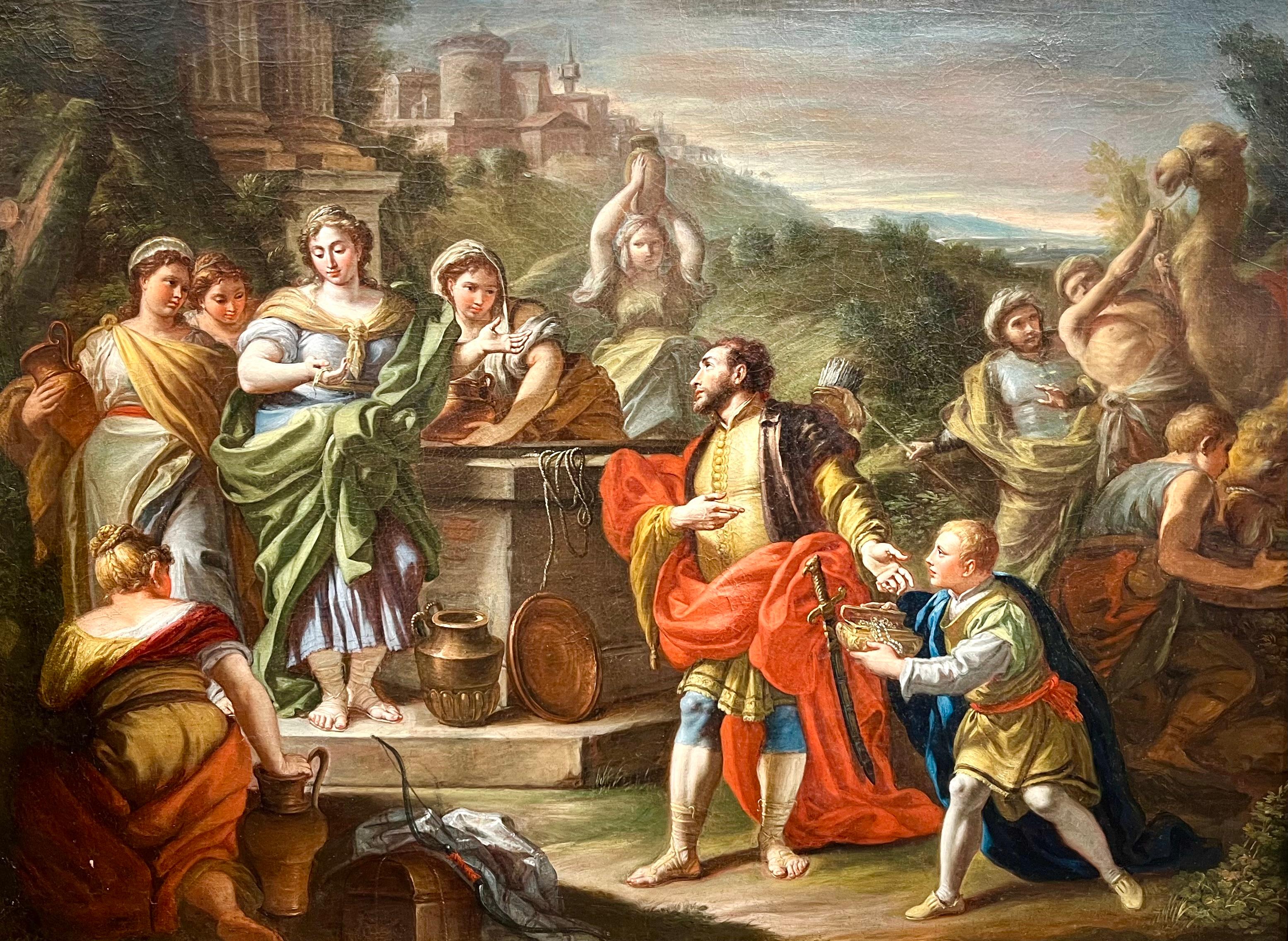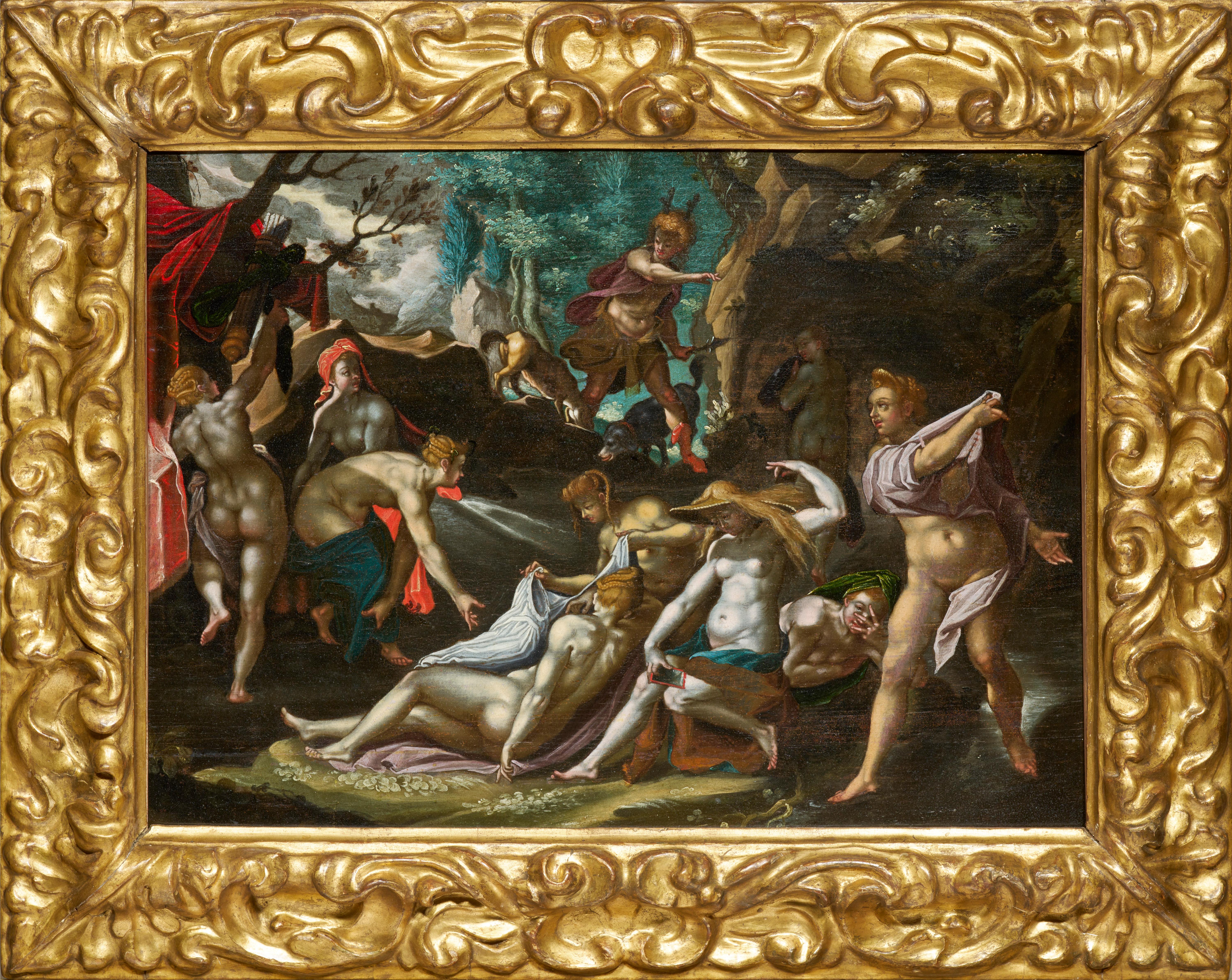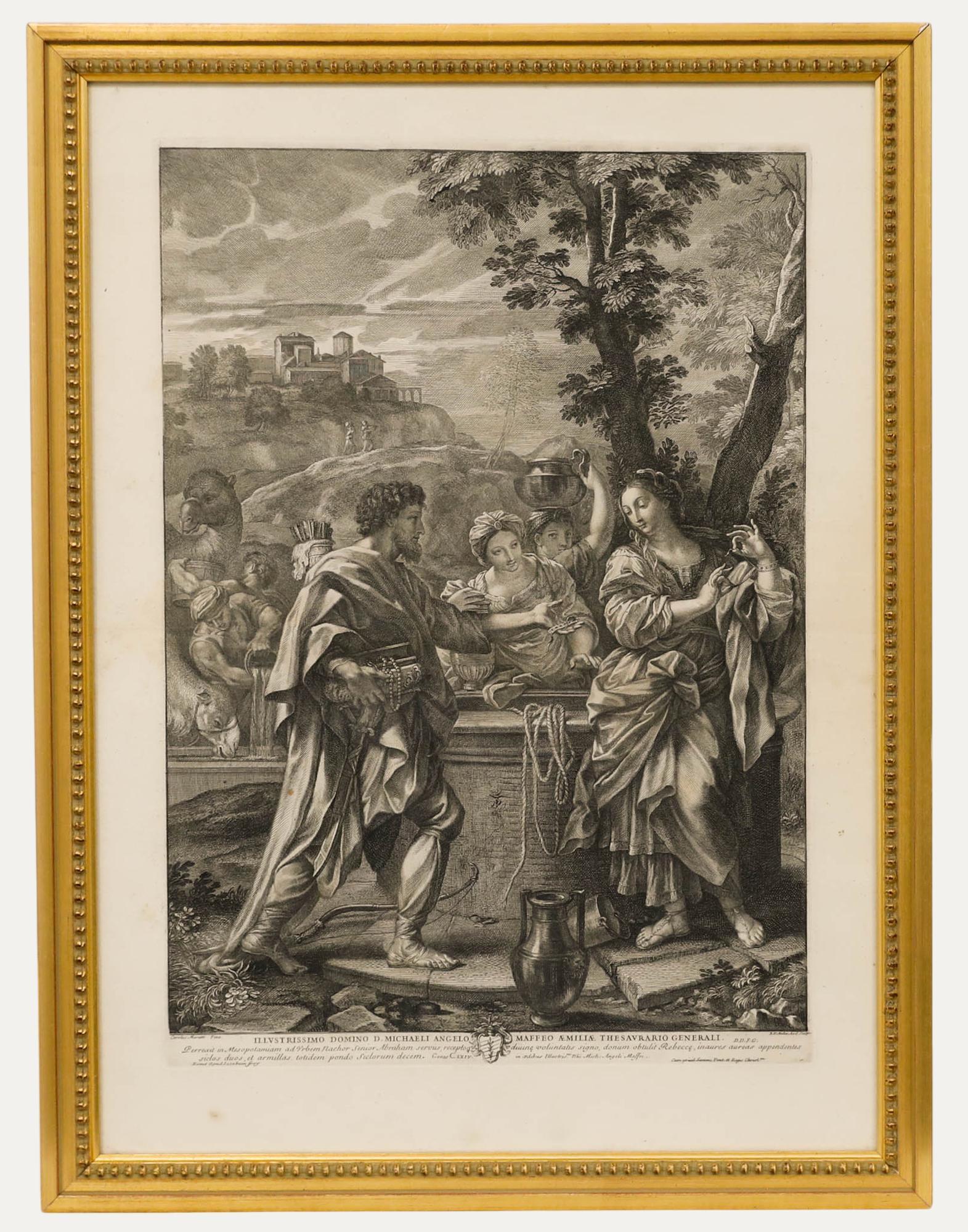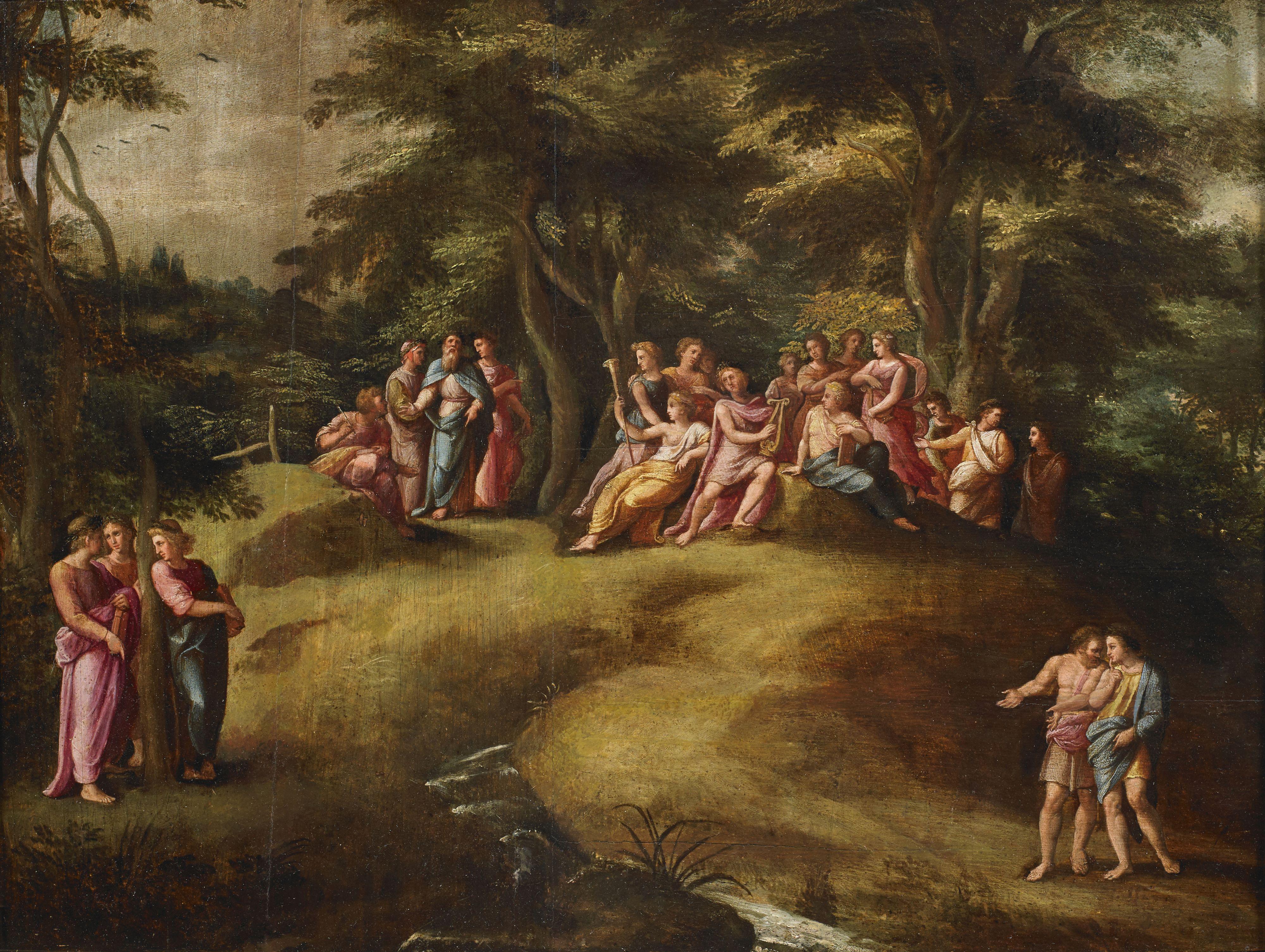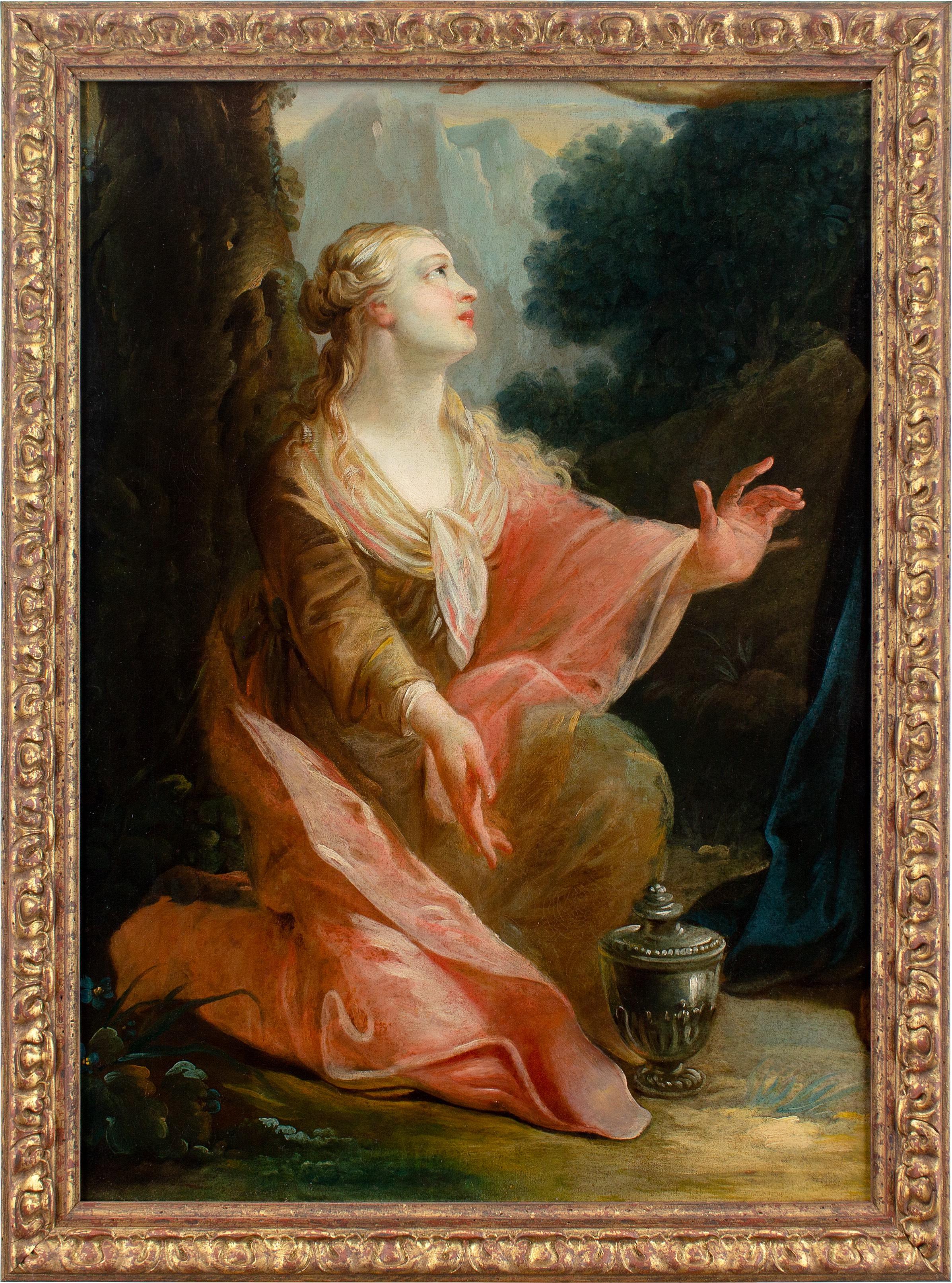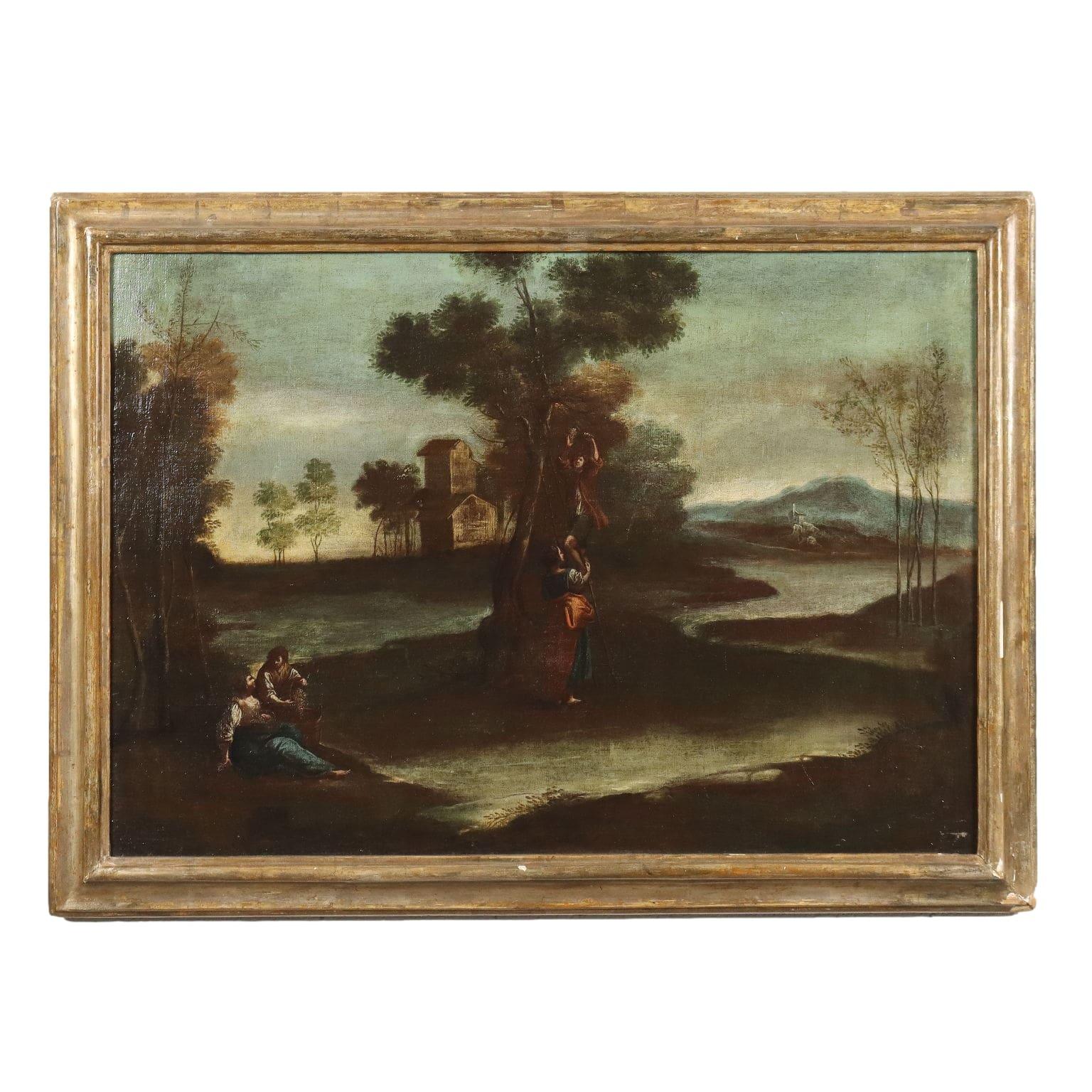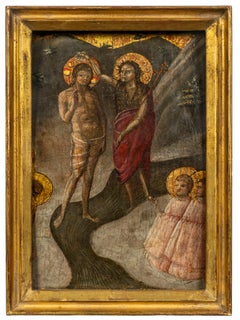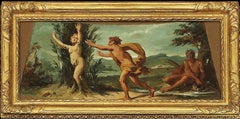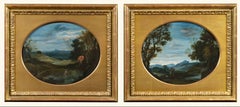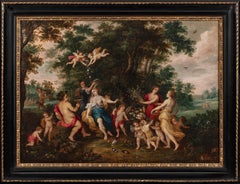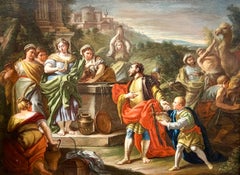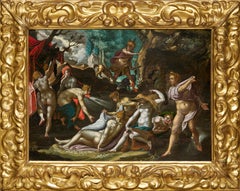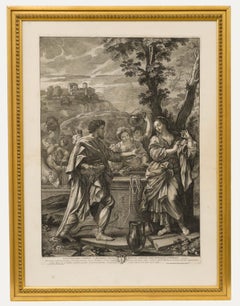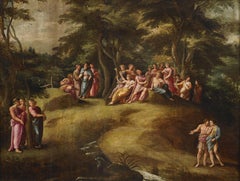Items Similar to Rebecca at the Well
Want more images or videos?
Request additional images or videos from the seller
1 of 4
Master of the Apollo and Daphne LegendRebecca at the Wellca. 1500
ca. 1500
$45,000
£34,498.21
€39,475.65
CA$63,595.14
A$69,125.40
CHF 37,003.94
MX$835,565.85
NOK 466,321.74
SEK 430,069.73
DKK 294,820.06
About the Item
Provenance:
Dr. James Henry Lancashire, Manchester-by-the-Sea, Massachusetts, by 1925; probably by descent to:
Private Collection, Cumberland Foreside, Maine, until 2018
This unpublished panel is a characteristic work of the Master of the Apollo and Daphne Legend, an anonymous Florentine painter in the circle of Bartolommeo di Giovanni, Domenico Ghirlandaio, and Sandro Botticelli. The artistic personality of the Master of the Apollo and Daphne Legend was independently recognized by Everett Fahy and Federico Zeri at roughly the same moment in time. Fahy originally dubbed this artist the Master of the Ryerson Panels but later adopted Zeri’s name for the artist, which derives from his eponymous works from the Samuel H. Kress collection (Figs. 1-2). Fahy posited that the artist was most likely a pupil of Ghirlandaio active from roughly 1480 to 1510, and that he may be identifiable with one of Ghirlandaio’s documented pupils to whom no works have been securely attributed, such as Niccolò Cieco, Jacopo dell’Indaco, or Baldino Baldinetti. The present painting was first attributed to this master by Everett Fahy in 1989, who became aware of its existence only after publishing his definitive studies on the artist.
The surviving body of work by the Master of the Apollo and Daphne Legend is largely composed of series of panels treating the same theme. In addition to the works illustrating the legend of Apollo and Daphne, there are also series on the themes of Susanna and the Elders and the story of Saint Joseph, among others. The subject of the present panel is drawn from Genesis 24, the story of Isaac. It is possible that our painting relates to another work by the artist depicting the Sacrifice of Isaac formerly in the collection of E. A. McGuire in Dublin, Ireland (Fig. 3), and that these two panels were originally part of a decorative scheme based on the story of Isaac.
Although the Master’s paintings of this type have traditionally been considered painted fronts of wedding chests, known as cassoni, the scale of these paintings and the fact that they are often part of a series indicates that they are more likely spalliera panels—paintings set into furniture or the wainscoting of a room. The biblical episode depicted in this painting centers on the theme of marriage, which suggests that this work was likely commissioned for the domestic interior of a newly married couple. The Master has transcribed into paint even the minute details of this Old Testament story, in which Abraham sends a servant to travel by camel to the land of his father and seek out a wife for his son Isaac. The servant is here shown at the well where he encounters Rebecca. As in the biblical account, Rebecca is shown offering water to the servant and his animals—which she delicately pours into a basin—and he in turn offers her jewelry.
A recent cleaning of the painting has revealed the camel paddle leaning against a rock in the lower left, which had been obscured by old overpaint, as well as several pentimenti in the camel’s feet, Rebecca’s pitcher, her proper left shoulder, and the hill in the upper right. Also now visible is the artist’s underdrawing for a structure in the right background, which ultimately was excluded from the final composition.
This painting was in the collection of Dr. James Henry Lancashire in Massachusetts in the early twentieth century. The only known documentation of the work is an image made of it during a photographic campaign undertaken by the Frick Art Reference Library in 1925. Although it was then classified as Umbrian School, Everett Fahy encountered the photograph in the Frick photographic archive in 1977 (shortly after the publication of his dissertation on the followers of Ghirlandaio) and recognized this work as by the Master of the Apollo and Daphne Legend.
The painting does not appear in either of the sales of the Lancashire collection. It may have descended in the family before reappearing in 2018. Although nothing is known about the provenance of the painting prior to it being in the Lancashire collection in 1925, it is possible that the painting was acquired from the Florentine dealer and tapestry restorer Giuseppe Salvadori. The only other known early Italian paintings from the Lancashire collection were purchased from Salvadori between 1924 and 1925. It is therefore likely that the present panel was purchased from Salvadori as well.
- Creator:Master of the Apollo and Daphne Legend
- Creation Year:ca. 1500
- Dimensions:Height: 24.875 in (63.19 cm)Width: 45.25 in (114.94 cm)
- Medium:
- Movement & Style:
- Period:
- Condition:
- Gallery Location:New York, NY
- Reference Number:1stDibs: LU1027005632
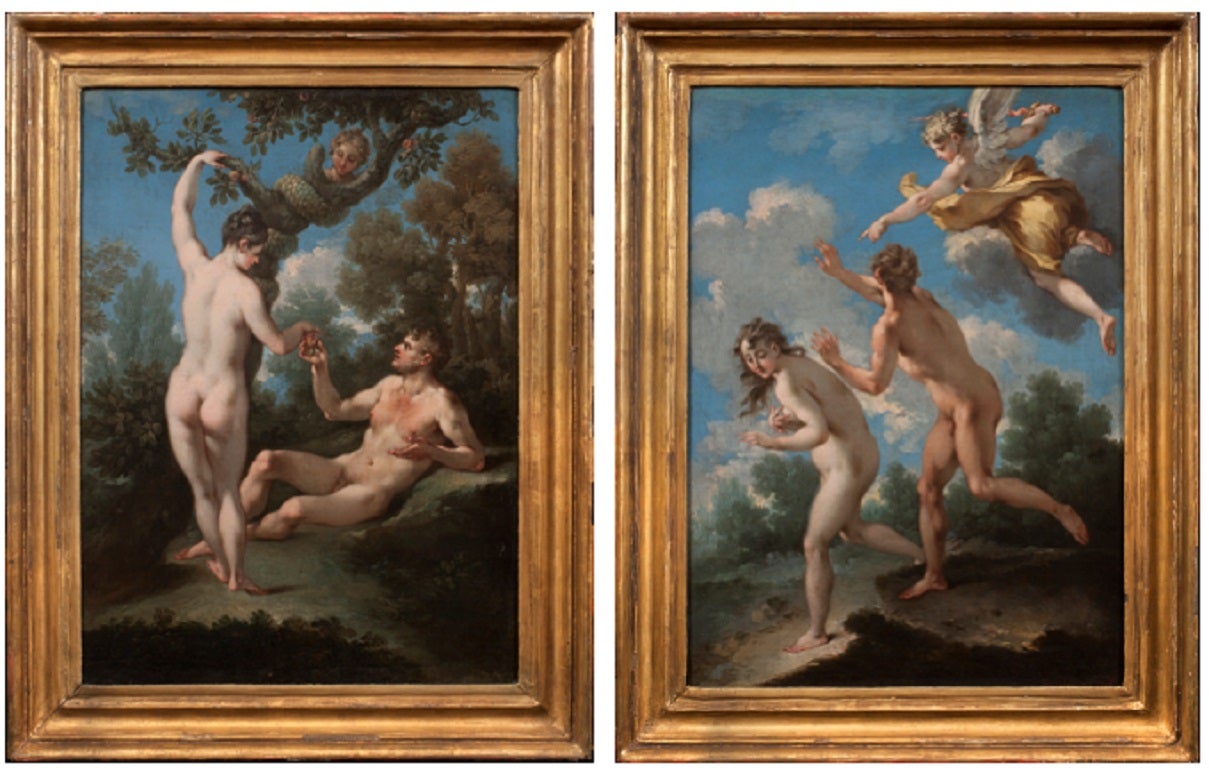
About the Seller
5.0
Recognized Seller
These prestigious sellers are industry leaders and represent the highest echelon for item quality and design.
Established in 1997
1stDibs seller since 2012
24 sales on 1stDibs
Typical response time: 7 hours
- ShippingRetrieving quote...Shipping from: New York, NY
- Return Policy
More From This Seller
View AllBaptism of Christ
Located in New York, NY
Provenance:
Achillito Chiesa, Milan
Luigi Albrighi, Florence, by 1 July 1955
with Marcello and Carlo Sestieri, Rome, 1969
Private Collection, Connecticut
Exhibited:
Mount Holyoke College Art Museum, South Hadley, Massachusetts (on loan, 2012)
Literature:
Carlo Volpe, “Alcune restituzioni al Maestro dei Santi Quirico e Giulitta,” in Quaderni di Emblema 2: Miscellanea di Bonsanti, Fahy, Francisci, Gardner, Mortari, Sestieri, Volpe, Zeri, Bergamo, 1973, pp. 19-20, fig. 18, as by the Master of Saints Quiricus and Julitta (now identified as Borghese di Piero).
This fine predella panel depicting the Baptism...
Category
15th Century and Earlier Old Masters Figurative Paintings
Materials
Tempera, Wood Panel
Seven Scenes from the Life of Apollo
By Jacopo Guarana
Located in New York, NY
Attributed to
Jacopo Guarana
(Verona 1720 – 1808 Venice)
Canvas, unsigned
The Deeds of Apollo
Provenance: Suida-Manning Collection
These seven scenes are brilliant evocations o...
Category
18th Century and Earlier Baroque Figurative Paintings
Materials
Oil
Two Scenes of Diana and Actaeon (a pair)
By Giovanni Battista Viola
Located in New York, NY
Provenance:
Robert L. and Bertina Suida Manning, New York, until 1996
Private Collection, USA
Giovanni Battista Viola was born in Bologna a...
Category
17th Century Baroque Landscape Paintings
Materials
Copper
Allegory of Abundance
Located in New York, NY
Painted in collaboration with Hendrick van Balen (Antwerp, 1575 – 1632).
Provenance: Private Collection, Uruguay, since the 1930s.
The eldest son of Jan Br...
Category
17th Century Old Masters Paintings
Materials
Copper
Esther in the Women's House of Ahasuerus
By Artus Wolfort
Located in New York, NY
Born in Antwerp, Artus Wolffordt received his training in Dordrecht where he became a master in 1603 at the age of twenty-two. He returned to his native city in 1615 and initially worked as an assistant to Otto van Veen...
Category
17th Century Old Masters Paintings
Materials
Oil, Panel
The Archangel Gabriel
By Cristobal de Villalpando
Located in New York, NY
Provenance: Private Collection, Cranston, Rhode Island (by the 1950s?); by family descent until sold at:
Bill Spicer Auction, North Kingstown, Rhode Island, 26 January 2011; where a...
Category
Late 17th Century Old Masters Figurative Paintings
Materials
Canvas, Oil
You May Also Like
Rebecca at the Well
Located in Fredericksburg, VA
Nicola Maria Rossi masterfully captures the biblical tale of Rebecca and Eliezer at the Well, a story from the Book of Genesis. In this scene, Abraham’s servant, Eliezer, arrives at ...
Category
18th Century Old Masters Figurative Paintings
Materials
Canvas, Oil
Diana and Actaeon, a Mannerist painting after Joseph Heintz the Elder
Located in PARIS, FR
This painting seduced us with its rich colors. Depicting Diana and her companions surprised by Actaeon, it was inspired by an engraving by Aegidius Sadeler II after a painting by Jos...
Category
17th Century Old Masters Nude Paintings
Materials
Oil, Wood Panel
Robert van Audenaerde after Carlo Maratti - Engraving, Rebecca at the Well
Located in Corsham, GB
A charming 18th-century engraving depicting the religious scene of Rebecca at The Well. Inscribed in plate. Presented in a gilt frame. On paper.
Category
Early 18th Century Figurative Prints
Materials
Engraving
16th Century Parnassus Biagio Pupini called Biagio delle Lame Muses Oil on Panel
Located in Sanremo, IT
This painting (in an excellent state of conservation and of fine executive workmanship, attests to the enormous
luck of Raphael's inventions in the years following his death: in fact...
Category
16th Century Italian School Figurative Paintings
Materials
Oil, Panel
Late 18thC Venetian School Mary Magdalene Noli Me Tangere Oil Painting
Located in Cheltenham, GB
US buyers pay no import tariffs on this item.
This late 18th-century Italian oil painting fragment depicts Mary Magdalene kneeling alongside an alabaster jar. Christ’s hand is parti...
Category
18th Century Italian School Figurative Paintings
Materials
Canvas, Oil
Painting Landscape with Figures, 18th century
Located in Milan, IT
Oil on Canvas. North Italian school of the 18th century.
The landscape, set on the bank of a wide river, features several figures of peasants in the center intent on picking fruit fr...
Category
18th Century Other Art Style Landscape Paintings
Materials
Oil
$2,480 Sale Price
20% Off
More Ways To Browse
Antique Wedding Chest
Antique Wedding Chests
Apollo Daphne
15th Century Panels
Antique Wainscoting
Antique Wainscotting
Apollo And Daphne
Rebecca At The Well
Rebecca Well
Master Apollo
Gary John Batman
Giuseppe Maria Crespi
Greek Smyrna
Gunnar Anderson
Gustave De Jonghe
Hart Schaffner Marx
Heavy Horses Paintings
Helen Bradley
